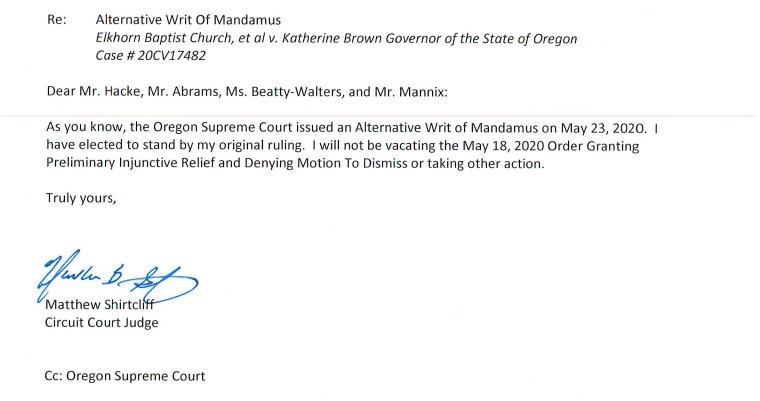Baker County judge refuses to lift or explain ruling against Gov. Brown’s orders

(Update: Judge refuses to lift injunction, explain why ruling should stand)
BAKER CITY, Ore. (KTVZ) -- A Baker County judge who ruled against Gov. Kate Brown's COVID-19 orders last week refused Monday to lift his preliminary injunction or explain himself further, as directed by the Oregon Supreme Court.
In a one-paragraph letter to the court and parties to the lawsuit, Circuit Judge Matthew Shirtcliff noted Saturday's alternative writ of mandamus from the high court.
"I have elected to stand by my original ruling," he wrote. "I will not be vacating the May 18, 2020 order granting preliminary injunctive relief and denying motion to dismiss or taking other action."
Under the Supreme Court's timeline, the state now has until Thursday to file a brief with the court, while the plaintiffs and intervenors have until next Tuesday, June 2, to file their responding briefs. The court on Saturday laid out no timeline for its ruling in the case.
The high court had issued an "alternative writ of mandamus" in the case of a lawsuit brought by Elkhorn Baptist Church and nine others, including two Bend churches, who claimed the governor acted unconstitutionally when she extended her executive orders beyond 28 days without legislative approval.
Shirtcliff ruled a week ago that Brown's orders to curb the spread of COVID-19 could not extend beyond 28 days. He also found that churches could not be required to stay closed when similar businesses have been allowed to reopen under social distancing and other guidelines.
Shirtcliff ruled that Brown had exceeded her authority by shutting down in-person religious services to slow the spread of the novel coronavirus. The lawsuit was brought by 10 churches around Oregon and later was joined by several local elected officials and business owners.
Shirtcliff’s broad ruling also invalidated many of the other provisions of Brown’s stay-at-home order, including a ban on public gatherings and a ban on non-essential businesses and sit-down service in bars and restaurants.
Hours later, Supreme Court Presiding Justice Thomas Balmer issued a stay, blocking the injunction from taking effect, pending further review by the full court.
Saturday's order had directed Shirtcliff to vacate last Monday's ruling that declared Brown's orders "null and void" by 5 p.m. Tuesdasy or to explain in court briefs why it should not do so.
"Oral arguments or other future actions will depend on additional orders of the Supreme Court," Judicial Department spokesman Todd Sprague said. "Once the briefs are filed, there is not a specific timeline for a decision."
On Friday, President Trump said churches and other houses of worship are "essential" and should be allowed to reopen this weekend, also vowing to override any governor's order that required them to stay closed. The legal impact on the Oregon case is unclear, as is the president's ability to override governors who fail to comply.
In his opinion, Shirtcliff wrote that the damage to Oregonians and their livelihood was greater than the dangers presented by the coronavirus. He also noted that other businesses deemed essential, such as grocery stores, had been allowed to remain open even with large numbers of people present and have relied on masks, social distancing and other measures to protect the public.
“The governor’s orders are not required for public safety when plaintiffs can continue to utilize social distancing and safety protocols at larger gatherings involving spiritual worship,” he wrote.
Courts in other states have ruled against similar orders. The Wisconsin Supreme Court struck down Gov. Tony Evers’ stay-at-home order last week, ruling that his administration overstepped its authority when it extended the order for another month without consulting legislators.
A federal judge in North Carolina on May 16 sided with conservative Christian leaders and blocked the enforcement of restrictions that Gov. Roy Cooper ordered affecting indoor religious services during the pandemic.
The order from Judge James C. Dever III came days after two churches, a minister and a Christian revival group filed a federal lawsuit seeking to immediately block enforcement of rules covering religious services within the Democratic governor’s executive orders.
Here's the Oregon Judicial Department's media release on Saturday's Supreme Court decision:
